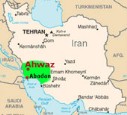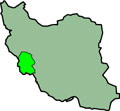 Amnesty International reports that Davoud Abdollahi Moghadam, 40 years, armycolonel is hanged in Evinprison Tehran. He was sentenced to death in Februar 2007 on charges of spying.
Amnesty International reports that Davoud Abdollahi Moghadam, 40 years, armycolonel is hanged in Evinprison Tehran. He was sentenced to death in Februar 2007 on charges of spying.
Moghadam was arrested 11 years ago and was in Evinprison since 2006.
Newspaper Kargozaran reports that July 10 a man, Ahmad (32) will be hanged in public in the village Ahmadabad near the city Varamin.
This will be the first public hanging since Shahroudi, head of the Iranian judiciary, sent an order banning public hangings unless special permission is given by him. He has now approved the public execution. On the third day of the military maneuvers called Great Prophet III, Iran tested long range missiles from a ship in the Persian Gulf.
On the third day of the military maneuvers called Great Prophet III, Iran tested long range missiles from a ship in the Persian Gulf.
Wednesday the Islamic Revolution Guards Corps (IRGC) fired nine long and medium range missiles including the Shahab 1, 2, 3, Fateh and Zelzal rockets.
There were also scuba divers and marines who conducted practice assaults with speed boats on hypothetical enemy targets. Since a few days an e-mail with the text Worldwar III broke out and USA already attacked Iran, circulates.The mail links to a malicious website with an embedded video.
Since a few days an e-mail with the text Worldwar III broke out and USA already attacked Iran, circulates.The mail links to a malicious website with an embedded video.
When people click on the videolink, an trojanexploit iran_occupation.exe is executed.
The name of the trojan is Storm Worm.
Domainnames, used by the worm are statenewsworld.com, morenewsonline.com,
dailydotnews.com, dotdailynews.com en newsworldnow.com. Iran Focus reports that a military fighterjet has crashed in Ahwaz, Khuzestan.
Iran Focus reports that a military fighterjet has crashed in Ahwaz, Khuzestan.
ALO reports that the Ahwazi Brigade "Fatah Al-Ahwaz" took responsibility for the attack. The attack was a retaliation for the burning-down by the government of palmfarms near Abadancity, to force the farmers to clear the area.
The ALO states that Arab and Iranian media also aacknowledged the retaliation.
(elaph.com and IRNA (fa)).
In Iran there are childoffenders, still on death row.
Children are being hanged to death.
A child will be hanged to death.
Poster amnesty.nl
Thursday, July 10, 2008
Iran: storm
Subscribe to:
Post Comments (Atom)

.jpg)


1 comment:
The United States and the Bush administration have been threatening Iran for years with its foreign policy and its rhetoric.
“I believe President Bush is going to order air strikes (on Iran) before he leaves office”
-Norman Podhoretz (Lyons, 2007).
Bush and his cronies say they want peace and diplomacy, but the problem with the members of Bush administration is that you can't trust them. You can't take what they at face value. As former Nixon aide John W. Dean wrote, “George W. Bush and Richard B. Cheney have created the most secretive presidency of my lifetime. Their secrecy is far worse than during Watergate” (quoted in Wittkopf and Jones, 2008, 329).
The administration secretly planned and prepared for war with Iraq without disclosing it to the general public. Planning began in November of 2001 and included upgrading airfields in various Gulf countries, moving supplies to the region and the construction of necessary facilities. By April 2002, the planning and preparation for war was also being hidden from Congress. Bush had instructed General Tommy Franks not to make financial requests through Washington. “Anything you need, you’ll have.” The money would no longer be appropriated through congress. By the end of July 2002, Bush had approved more than thirty projects totaling over $700 million. Congress had no knowledge or involvement (Woodward, 2004, 122).
In December of 2002, Bush and Rumsfeld agreed to start secretly deploying troops into the theatre so as not to attract the attention of the press or the rest of the world. The first deployment order went out on December 6, 2002 and deployments continued every two weeks or so thereafter. Troops were given less than a week’s notice at times. In January 2003, the Bush administration arranged for much of its humanitarian relief to be disguised as general contributions to conceal its war planning from the NGO recipients. Yet, when asked about Iraq, Bush’s favorite response was “I have no war plans on my desk.” At one point or another after the planning began, nearly every member of the administration publicly denied any plans to go to war with Iraq (Woodward, 2004, 129).
A better approach to Iran would be negotiations. While Fareed Zakaria agrees that there is no reason not to use sanctions and embargoes against states such as Iran, he suggests that we also need to “allow a viable way out.” That is to say, we need to negotiate and not merely mandate.
Post a Comment